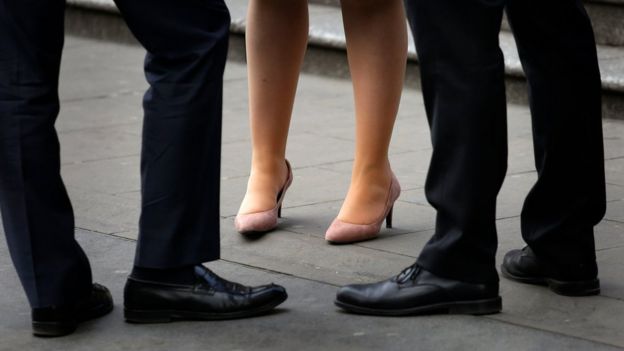- 2 hours ago
- Business
-
(여성) 호주의 경우 여성이 남성만큼 임금인상 위해 노력했어도 그 결과 여전히 미진아름다운 인생/여성 2016. 9. 6. 10:54
출처: http://www.bbc.com/news/business-37278170
** 밝은 하늘 **
1) 적지 않은 한국 여성들은 "한국사회에서 남녀간 임금차별이 심하다, 그래서 한국은 여전히 가부장제 사회"라고 불평하고 있다. 그런데 그녀들은 한국보다 훨씬 부유한 선진국에서도 여전히 남녀간 임금차별이 존재하고 있다는 사실은 아마 잘 모르거나 혹은 왜 그런지에 대해선 깊이 생각하지 않는 듯 하다.
2) 전세계적으로 아직 남녀간 임금차별이 존재한다는 사실이 곧 여성들이 과거에 비해 살기 어려워졌다는 사실을 말하는 게 아니라 오히려 과거보다 훨씬 여성들이 살기 좋아졌다는 사실을 의미한다.
3) 적지 않은 한국 여성들이 잊고 있는 게 있는데, 전세계적으로 여성들에게 참정권이 주어진 건 20세기에 들어와서이다. 미안한 얘기지만, 19세기까진 여성들에게 참정권이 없었다는 뜻이다. 언제부턴가 한국사회에도 여성들의 사회진출이 본격화되면서, 반대로 남성들의 삶은 더욱 힘들어진 측면도 없지 않아 있다. 동시에 남녀평등의 방향으로 인류가 진보하고 있다는 긍정적인 측면도 의미있는 사실이다.
4) 그러므로 한국사회의 여성들도 자신의 행복은 자신이 만들어간다는 더욱 주체적인 마인드를 가지고, 동시에 더이상 과거 가부장제 사회처럼 남성에게 기대어 행복한 인생을 살겠다는 수동적이고 의존적인 마인드(적지 않은 20-30대 한국여성들이 지니고 있음)는 지양해야, 진정으로 남녀평등이 이뤄질 것으로 생각된다.
Women seek pay rises as much as men - with less success 호주의 경우, 여성이 남성만큼 임금인상 위해 노력했어도 그 결과 여전히 미진
 PA
PAThe theory that women get paid less than men because they are not sufficiently pushy in the workplace is not true, a new study suggests. 여성들이 임금을 남성들보다 적게 받는 것이 직장에서 여성들이 임금인상을 위해 충분히 노력하지 않았기 때문이라는 논리는 사실이 아니라고 새로운 연구결과로 밝혀졌다. (pushy: 강요하는, 지나치게 밀어부치는)
Women are as likely as men to ask for a pay rise - but are less likely to get one, the research found. 여성들이 남성들처럼 임금인상을 요구한듯하지만 실제로 그렇지 않은 거 같다.
The study, by the Cass Business School and the universities of Warwick and Wisconsin, looked at 4,600 workers. 미국 워위크와 위스콘신 두 대학교와 카스 비지니스 대학이 공동으로 진행한 연구에서 4,600명의 근로자들을 조사했다.(연구주체는 미국의 두 대학교와 한 개 대학)
It found "no support" for the "reticent female" theory, whereby women avoided asking for more money. 연구에 의하면, 여성들이 더 많은 임금을 요구하지 않는 건 바로 "말이 없는 여성들(여성들의 침묵)"이란 이론을 "뒷바침할 만 한 게 없다"고 밝혀졌다. (whereby: ~하는, 한다는) (reticent: 말이 없는)
For what it claimed was the first time, the study eliminated any impact from part-time workers earning less than their full-time counterparts, by comparing full-time males with full-time females, and part-time males with part-time females.
When like-for-like male and female workers were compared, men were 25% more likely to get a pay rise when they asked, the study found. 연구에 의하면, 남녀를 비교해보니, 남녀 직원이 함께 임금인상을 요구했을 때 남자 직원이 여자 직원보다 25% 더 받았음을 확인할 수 있었다. (like-for-like: 은혜는 은혜로 갚는다, 원수는 원수로 갚는다. 같은 수로, 같은 차원에서, 같은 방법으로)
The research also concluded there was no evidence for the idea that women were reluctant to ask for a salary increase because they were more wary of upsetting their boss, or deviating from a perceived female stereotype. ●본 연구의 결론: 여자 직원들이 상사를 불쾌하게 만들지 모른다거나 여성에 대한 고정관념에서 벗어날지 모른는 두려움에서 임금인상을 요구하는데 소극적이었다는 증거는 없었다. (be wary of: 의식하다, 조심하다) (deviate from: 에서 벗어나다, 일탈하다)
When analysing the results, the researchers took into account the size of the employer and the industry, whether the workers were a parent, as well as their qualifications.
The study was based on data from the 2013-14 Australian workplace relations survey. Australia is thought to be the only country to systematically record whether employees had asked for a pay rise, and why they had or had not done so. ●본 연구의 기초 데이타: 2013년부터 2014년도 호주 직장 관련 조사. ●이 데이타를 사용한 이유: 호주는 근로자들이 임금인상을 요구했는지 안 했는지, 그리고 왜 그렇게 했거나 안 했는지, 체계적으로 기록한 유일한 나라이기 때문.
 PA
PAAndrew Oswald, professor of economics and behavioural science at the University of Warwick, said he was surprised by the findings.
"The fact that women don't ask for pay rises as often as men is a popular theory. It's a very common thing for women to say and believe, but all of the evidence is anecdotal, so it's very hard scientifically to do a proper test of this." 여성들은 남성들만큼 임금인상을 요구하지 않는다는 사실은 많은 사람들이 주장하는 논리다. 그런데 정말 여성들이 그렇다는 건 입증되지 않았다. (anecdotal: 일화적인, 이야기같은, 입증되지 않은)
'Pure discrimination'
He said one possibility was that unsuccessful men who asked for a pay rise, but did not get it, kept it to themselves, while women "were more straightforward and tell their friends".
"Having seen these findings, I think we have to accept that there is some element of pure discrimination against women," Prof Oswald added.
"It could be that Australia is odd. But it's a modern industrial economy halfway in character between Britain and the US, so I think that's unlikely."
The study also found differences according to age, with women and men under 40 both asking for and receiving pay rises at the same rate, which the researchers said could mean that negotiating behaviour had started to change.
Dr Amanda Goodall from Cass Business School - part of City, University of London - and a co-author of the study, said: "The study potentially has an upside. Young women today are negotiating their pay and conditions more successfully than older females, and perhaps that will continue as they become more senior."
'아름다운 인생 > 여성' 카테고리의 다른 글
(여성) 유엔의 신임 명예대사 원더우먼(wonder woman) (0) 2016.10.27 (여성) 여성의 성(性)에 관한 놀라운 사실 10 가지 (1) 2016.09.13 (여성/인도) 여성들이 입는 옷을 지정하는 인도 정치인들에게 전하는 말 (0) 2016.08.31 (여성/인도) 인도 최초로 HIV를 발견한 여성 (0) 2016.08.30 (여성) 여성지도자들은 언론의 편견 때문에 불리한가? (0) 2016.08.02